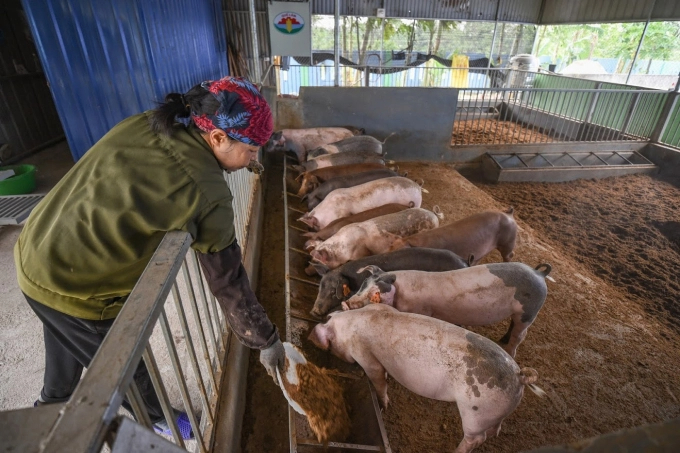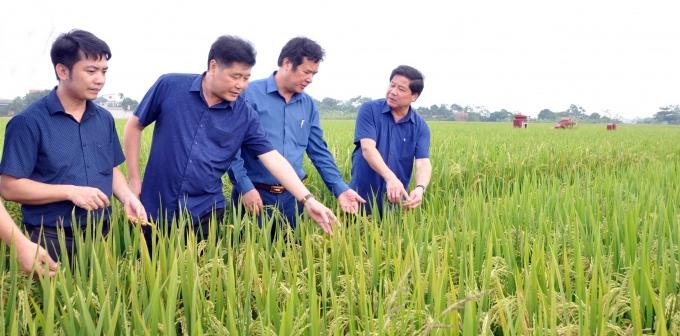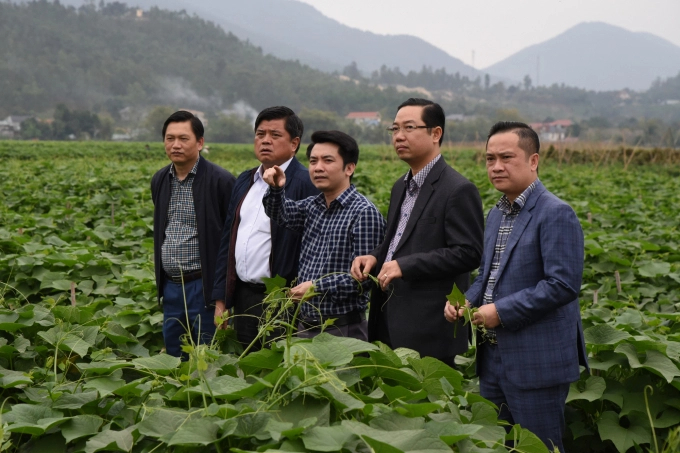May 21, 2025 | 03:11 GMT +7
May 21, 2025 | 03:11 GMT +7
Hotline: 0913.378.918
May 21, 2025 | 03:11 GMT +7
Hotline: 0913.378.918

Que Lam's organic biosafety breeding model. Photo: Tung Dinh.
Director Le Quoc Thanh of the National Agricultural Extension Center said that it has succeeded in building the project on both fields of livestock and crop. As a role of a bridge, the center has connected enterprises, cooperatives, and farmers to link production in chains.
In terms of crops, the project built a cooperative model to link organic rice production along the value chain in some northern provinces to implement over 570ha of organic rice. The initial results showed that the rice yield reached 58-60 tons per ha with quality meeting the organic standards. As Que Lam Group covered all products, the economic efficiency of the model increased compared to the usual production. The project also transfers the model of production organization linking cooperatives, farmers, and enterprises along the value chain of cultivation, processing, and consumption of products.
“The selling price of the organic rice products is 15-20% higher than that of mass-produced rice while the cost for fertilizers and crop protection agents reduced by 25-30%, therefore, the economic efficiency in organic rice planting increased 20-25%. On the other hand, the model is friendly to the soil and water environment, which were improved significantly, some creatures including fishes, shrimps, crabs, snails in organic rice crops rose in both quantity and quality,” reported the National Agricultural Extension Center.
For livestock, the project built the model of organic pig production with a scale of 1,040 pigs in five provinces of Vinh Phuc, Thai Nguyen, Nam Dinh, Quang Binh, and Thua Thien Hue. The results show that the project is highly effective, especially during the outbreak of African swine fever.

The model of organic rice production is jointly implemented by the National Agricultural Extension Center and Que Lam Group in Vinh Phuc. Photo: Hoang Anh.
In particular, the cooperation between the center and Que Lam Group has detailed the public-private partnership in agricultural extension activities. The model shows that the budget for supporting capital is affordable (VND7 billion VND for rice farming model and VND5.5 billion for pig farming model), but thanks to Que Lam Group’s investment capital of (VND21 billion) and reciprocal capital of cooperatives and households (VND9.5 billion), the model have been effectively implemented.
Therefore, in the coming time, the National Agricultural Extension Center and Que Lam Group will continue to implement the project, summarize, evaluate and expand the scale. Piloting the construction of an organic farming village, applying a circular economy model, step by step summarizing and replicating into production among others.
To realize the aforementioned content, the units proposed competent agencies under MARD to cooperate to assess the available agricultural models, to detect difficulties and bottlenecks in productions… to have proper measures and mechanisms to help cooperative and enterprises to forcibly invest and swift to organic models.
“Que Lam Group has strengths in organic fertilizer production, an input factor that plays a very important role in developing organic agriculture in the direction of the Party and State. Que Lam Group is also very responsible for the development of organic agriculture, therefore, in addition to the successful rice and livestock production chain, here we propose to expand cooperation with the group to link production on fruit trees, especially in key areas," suggested Le Quoc Thanh.
Assessing the models, especially for the livestock farming model, Deputy Minister Tran Thanh Nam said that, it is necessary to reconstruct the small livestock household farming it relates to farmers' livelihoods and the problem of market manipulation by large Grouporations so that it cannot be skipped.
Le Duc Thinh, Director of the Department of Economic Cooperation and Rural Development said that there are more than 1,000 livestock cooperatives nationwide, many of which are outsourced to large Grouporations. This fact reveals several problems such as dependence on inputs, prices, and especially environmental problems. The breeding models of Que Lam Group have solved those problems. Therefore, in the immediate future, the department picks three cooperatives that want to cooperate and associate with Que Lam to farm pigs according to biosecurity procedures, towards the replication of the model.

Deputy Minister Tran Thanh Nam inspects the organic chayote farming model of Que Lam Group in Vinh Phuc. Photo: Hoang Anh.
Highly appreciate Que Lam’s biosafety breeding model, Nguyen Van Trong, Deputy Director of the Department of Livestock Production, added that, recently, the MARD has ordered Que Lam five clusters of scientific topics from seed, feeding stock, processing, microbial products... to improve the livestock production process in a closed and circular chain, the input of cultivation must be the output of livestock and vice versa.
Deputy Minister Tran Thanh Nam stressed that MARD will cooperate with Que Lam Group to implement duplication of the organic livestock and crop farming models via cooperatives, he directed the National Agricultural Extension Center to join hands with organic cooperatives according to agricultural chain links.
Second, develop a process to implement organic agricultural standards in each specific field, and coordinate with Que Lam Group to pilot the construction of an organic farming village. Towards the integration of organic agriculture criteria into the new rural construction program. For example, promulgating food safety and hygiene standards in new rural construction.
Third, continue to build models to evaluate and evaluate effectiveness to mobilize people to participate in the chain of organic agricultural production.

(VAN) Japan's grant aid project contributes to capacity building, promoting organic agricultural production, and fostering sustainable community development in Dong Thap province.

(VAN) For years, the CRISPR-Cas9 genome technology has been reshaping genetic engineering, a precision tool to transform everything from agriculture to medicine.

(VAN) Vietnam aims to become a 'leader' in the region in the capacity and managing effectively soil health and crop nutrition.
![Reducing emissions from rice fields: [Part 1] Farming clean rice together](https://t.ex-cdn.com/nongnghiepmoitruong.vn/608w/files/news/2025/05/05/z6509661417740_a647202949c539012a959e841c03e1d3-nongnghiep-143611.jpg)
(VAN) Growing clean rice helps reduce environmental pollution while increasing income, allowing farmers to feel secure in production and remain committed to their fields for the long term.
/2025/05/19/5136-1-144800_230.jpg)
(VAN) The Nghe An Provincial People's Committee has just approved the list of beneficiaries eligible for revenue from the Emission Reductions Payment Agreement (ERPA) in the North Central region for the year 2025.

(VAN) 14 out of 35 domesticated elephants in Dak Lak province have had their living conditions improved, with 11 of them currently participating in the non-riding elephant tourism model.

(VAN) Muong Nhe Nature Reserve hopes that being upgraded to a national park will lay the foundation for forest protection efforts to be carried out in a systematic, modern, and sustainable manner.